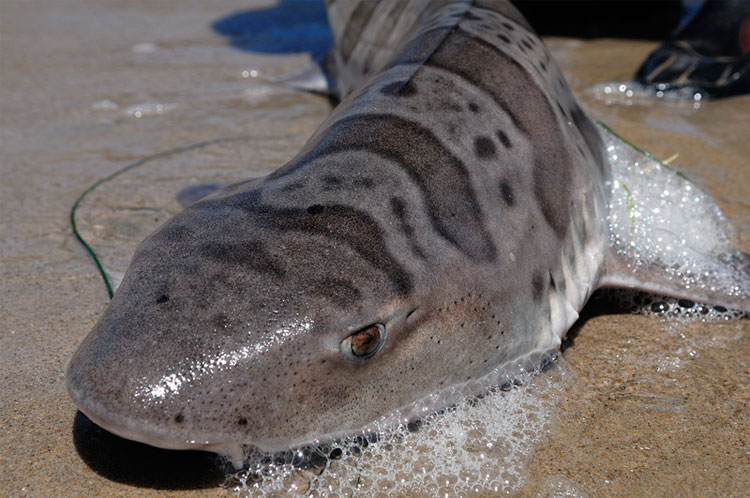2,000 brain-eating sharks, drifting to the US coast
People living near the San Francisco Bay area, the United States witnessed the sight of more than 2,000 mysterious sharks, washed ashore by the waves within a few months.
According to the Daily Mail, not only leopard sharks, other marine creatures like rays, bass, big pomfret and other fat creatures also mysteriously died in San Francisco Bay.
The death of thousands of precious sea creatures makes many people worried about the marine environment here, forcing scientists to find out the cause urgently.

Leopard sharks are 3.2 meters long and weigh up to 900kg.
Investigating reports by scientists in the US said that the mass death of marine organisms could be related to a parasite, through breathing holes and eating host brains.
Dr. Mark Okihiro, a researcher at the California Center for Marine and Wildlife Animals, said the culprit is most likely a parasite named Miamiensis avidus . They are single-celled parasites , known by the scientific community as 'zombies'.
Examining the bodies of sharks that drifted ashore, scientists all found their brains severely damaged. Traces of the parasite remain in the brain of ill-fated sharks.
According to Mr. Okihiro, this process of brain-eating parasites is slow. Initially, sharks have almost no abnormal expression. But later, the damaged brain makes us swim around, or lose the ability to orient and eventually drift ashore.
From February to July 2017, California's fisheries and wildlife agency estimates that 2,000 tiger sharks die in San Francisco Bay. But this number may be even bigger because the dead shark in the sea tends to sink deeper into the sea floor rather than being washed ashore by the waves.

Brain-eating parasites are the culprits that cause 2,000 leopard sharks to drift to the coast.
Marine biologist Andrew Nosal, of the University of California, San Diego, said the mass deaths of leopard sharks greatly affected the region's ecosystem.
Currently, scientists are seeking to rescue sharks and many other marine creatures before this terrifying brain-eating parasite.
Leopard sharks are about 3.2 meters long and weigh up to 900kg. On the small bodies of them appear stripes or spots like leopard.
They are considered one of the most feared predators in the ocean. Leopard sharks and bull sharks are the two species that most often attack humans.
- More than 50 mysterious dead sharks, drifting to the English coast for 1 day
- From the vomit of sharks, science finds them eating a kind of bait no one thinks of
- Panic of thousands of sharks surrounding the US coast
- New research shows that hammer sharks may be more like 'vegetarian' than meat
- Video: Visitors 'give birth to' sharks
- Video: Save three baby sharks in the womb
- Bizarre creatures glow in the night drifting to Australian beaches
- Video: Sharks attack people near the coast
- Discovered giant whale fish drifting to the US coast
- Rare whales drift on American beaches
- Sharks eat more grass than meat makes the science world confused
- Video: 15,000 sharks on Florida waters
 Surprised: Fish that live in the dark ocean still see colors
Surprised: Fish that live in the dark ocean still see colors Japan suddenly caught the creature that caused the earthquake in the legend
Japan suddenly caught the creature that caused the earthquake in the legend A series of gray whale carcasses washed ashore on California's coast
A series of gray whale carcasses washed ashore on California's coast Compare the size of shark species in the world
Compare the size of shark species in the world The world's most mysterious creature has a very 'cool' name, its ancestors lived nearly 400 million years ago!
The world's most mysterious creature has a very 'cool' name, its ancestors lived nearly 400 million years ago!  Killer whale pair kills 17 sharks a day
Killer whale pair kills 17 sharks a day  Crocodile collides with sharks right on the beach
Crocodile collides with sharks right on the beach  Animals humans have never seen the process of giving birth
Animals humans have never seen the process of giving birth  New discoveries about mysterious predatory fish in the ocean
New discoveries about mysterious predatory fish in the ocean  Global warming causes many marine animals to die en masse because of... cold
Global warming causes many marine animals to die en masse because of... cold 